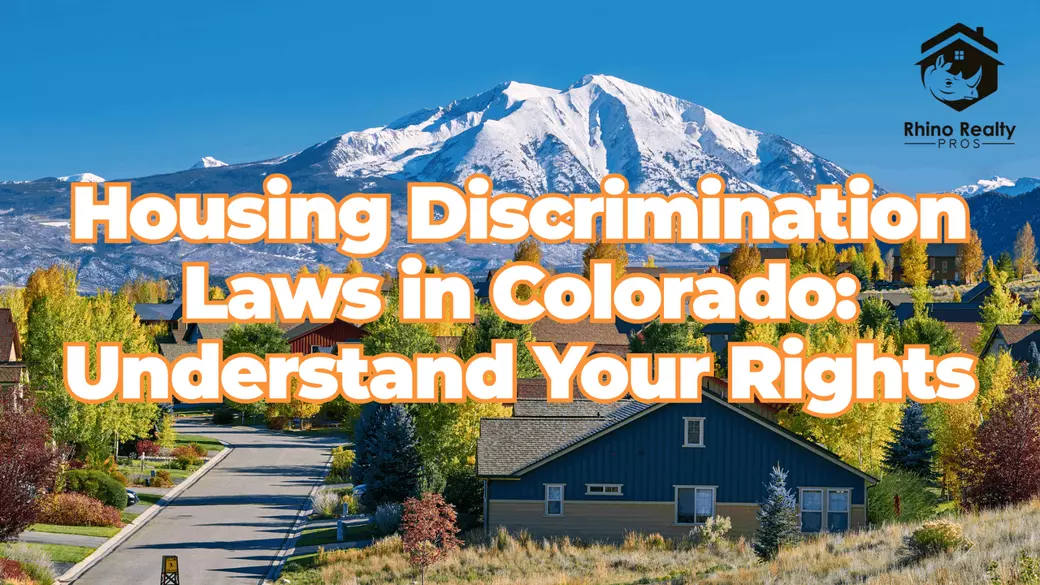Housing Discrimination Laws in Colorado: Know Your Rights

In Colorado, as in the rest of the United States, housing discrimination is illegal. However, understanding your rights and knowing how to protect yourself from discrimination in housing can be a bit complicated. Whether you’re renting, buying, or selling a property, it’s important to understand the legal protections in place to ensure fair treatment in housing transactions. Here’s a breakdown of housing discrimination laws in Colorado and what you need to know.
Federal Fair Housing Act
The Fair Housing Act (FHA), a part of the Civil Rights Act of 1968, is a federal law that prohibits discrimination in housing based on race, color, national origin, religion, sex, familial status, and disability. This law applies to nearly all housing-related transactions, including:
-
Renting or leasing apartments or homes
-
Selling or buying property
-
Mortgage lending and insurance
-
Advertising for housing
This law protects tenants and prospective homebuyers from unfair treatment by landlords, real estate agents, sellers, and lenders.
Colorado Fair Housing Act
In addition to federal protections, Colorado has its own set of housing discrimination laws under the Colorado Anti-Discrimination Act (CADA). These state-level laws provide protections against housing discrimination that go above and beyond the federal Fair Housing Act.
Under CADA, the state protects individuals from housing discrimination based on:
-
Race, color, national origin, religion, sex, disability, and familial status (in line with the federal law)
-
Sexual orientation and gender identity are also protected under Colorado law, which is more inclusive than federal law.
-
Marital status is another unique aspect of Colorado's protections. You cannot be denied housing or face different terms based on whether you are married, single, or divorced.
This means that if you experience housing discrimination in Colorado, your rights are protected both at the federal and state level.
Prohibited Practices in Housing
Both the Fair Housing Act and Colorado Anti-Discrimination Act prohibit specific discriminatory practices. These include:
-
Refusing to rent or sell to someone based on a protected characteristic.
-
Changing the terms or conditions of housing, such as rent, based on someone's race, religion, sex, or other protected status.
-
Advertising in a way that discourages individuals from applying for housing (e.g., "no children allowed" or "no disabled individuals").
-
Harassing a tenant based on their protected status or retaliating against a tenant for exercising their rights under the law.
-
Discriminating in mortgage lending by offering different terms or refusing to offer a loan based on race, sex, or disability.
If you experience any of these actions during your housing search or while renting or purchasing a home, you may have been a victim of discrimination.
What to Do if You Experience Discrimination
If you believe you have been a victim of housing discrimination in Colorado, there are steps you can take to protect your rights:
-
Document Everything: Keep a record of any discriminatory actions. Write down what happened, when it happened, and who was involved. If possible, collect any written communications such as emails or texts.
-
File a Complaint: You can file a complaint with the Colorado Civil Rights Division (CCRD) or the U.S. Department of Housing and Urban Development (HUD). Both agencies handle housing discrimination complaints and can investigate the situation. The CCRD is the primary agency in Colorado for enforcing the state's housing discrimination laws.
-
Seek Legal Advice: If you believe your rights have been violated, it may be helpful to consult with a real estate attorney or civil rights lawyer. They can guide you through the process and help you understand your options for legal recourse.
-
Fair Housing Resources: Colorado offers resources to both tenants and landlords regarding fair housing practices. Many organizations and nonprofit groups, such as The Colorado Fair Housing Center, provide education and advocacy for individuals facing discrimination.
How to Avoid Discrimination in Housing
While it’s important to know your rights, it’s also helpful to be proactive in preventing discrimination from happening in the first place. Here are a few tips:
-
Know the Laws: As a tenant, buyer, or seller, familiarize yourself with the federal and state housing laws. Understanding your rights and responsibilities is key to avoiding discrimination.
-
Ask Questions: If something seems off during a housing transaction, don’t hesitate to ask questions. Make sure all communication is clear and documented.
-
File Complaints Early: If you feel discriminated against, don’t wait too long to file a complaint. There are time limits on when you can legally file a complaint, so it’s important to act quickly.
Conclusion
Housing discrimination is a serious issue that can affect individuals from all walks of life. In Colorado, the law provides strong protections against unfair treatment in housing based on race, color, religion, sex, familial status, disability, sexual orientation, gender identity, and marital status. By understanding the housing discrimination laws in Colorado, you can ensure your rights are upheld and that you are treated fairly in all housing transactions. If you believe you've been discriminated against, don't hesitate to file a complaint or seek legal advice to protect your rights.
Categories
Recent Posts











